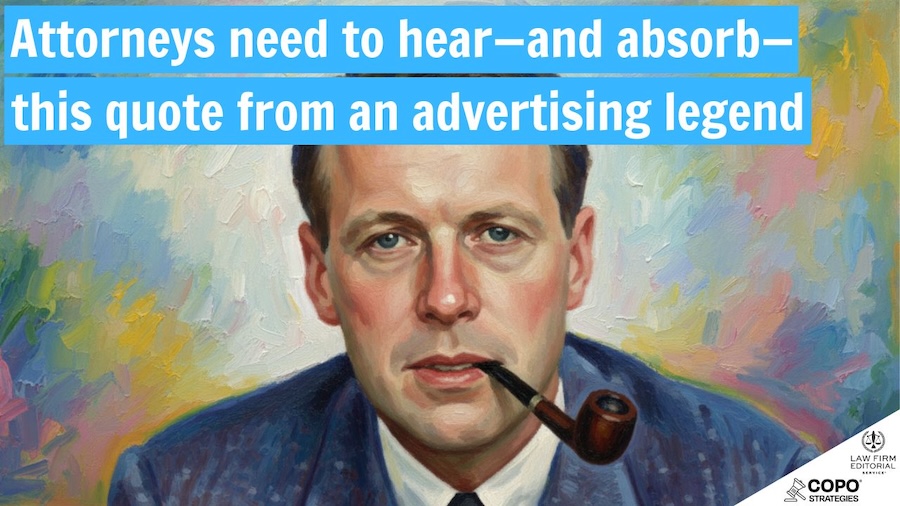If attorneys don’t figure out how to successfully market themselves, they’ll be looking, metaphorically, at many empty pews.
David Ogilvy, one of the most famous “ad[vertising] men” of all time, said that “you can’t save souls in an empty church.”
He was talking about how a product or service can’t be effective — “save souls” — if people don’t know that it exists — the “empty church.”
He might as well have been talking to attorneys. If you are one, or you assist one with their marketing or business development efforts, Ogilvy’s quote should hit you like a ton of bricks.
An attorney can’t attract clients, help them with their legal or business issues, and make a difference in their lives if those clients don’t know the attorney exists, don’t know the kind of law the attorney practices, and don’t know how the attorney can help them.
To attract clients, attorneys can’t blend in with the furniture. They need to stand out from other attorneys who practice the same kind of law they do.
They can’t be boring. They need to be memorable.
“Memorable” doesn’t necessarily mean being flashy or over the top. It just means that an attorney has done enough marketing, including networking, to be top of mind for people who are the attorney’s ideal clients.
Attorneys can “save souls” by separating themselves from a pack of faceless competitors
When an attorney maps out all the ways they market themselves and develop business, they can appreciate all the ways they can be memorable so that they avoid building an empty church.
When it comes to attorneys’ writing, they should write frequently and consistently, with the goal of publishing at least one article or blog post per month and at least one LinkedIn post every week or two.
Their writing should be engaging, not academic. When they talk about a legal development, they should do more than simply explain what that development is. They should discuss the importance of the development and what their target audience needs to do now because of it.
When it comes to their speaking engagements, they can stand out by not just reciting statutory provisions for 60 minutes or walking through case after case, boring the audience to tears. They should lighten the mood. They should maybe tell a joke or two. Make pop culture references. Tell stories. They should aim to present their material in a way that makes audience members think to themselves that that presentation was one of the better ones they’ve attended recently.
When it comes to their client service, they can avoid building an empty church by, in addition to doing great work and getting great results for clients, striving to be someone whom clients want to talk to. That means coming across as more well-rounded than the typical attorney (who’s all business) by taking an interest in their clients, getting to know them personally, and building a relationship that’s not transactional.
When it comes to their networking, they’ll be memorable by engaging with people they aren’t already tight with by asking questions, asking more questions, and then keeping the conversation going by discussing topics related to the world outside of work—all so they can connect on a human level.
Most attorneys don’t network this way. They tend to keep their conversations at a high level and mostly “all business.” By doing so, they miss out on opportunities to build relationships while networking.
When it comes to their personal branding, whether it’s their online bio, LinkedIn profile, or elevator pitch, they can stand out by talking about what they do and who they do it for. For example, they shouldn’t refer to themselves as merely a “deals attorney.” They could refer to themselves instead as an attorney “who helps healthcare companies navigate today’s challenging business environment, including by acquiring complementary companies.”
Beyond that, attorneys should insert some of their personality into their description of what they do and who they do it for. This could be in the form of discussing their background, explaining why they do what they do, how they actually assist their clients, or what they enjoy most about their practice. Whatever they settle on, they should aim to give their personal branding more pizzazz than simply a black-and-white description of what they do, the law school they attended, and the organizations they are part of.
Finally, when it comes to business development, attorneys could keep the church full by actually staying in touch with their contacts. That means staying in touch monthly or, at the very least, quarterly. That also means being memorable by remembering holidays and their contacts’ personally important dates, such as birthdays and anniversaries, and sending cards or small gifts to commemorate holidays or special days.
A quote about adverstising that hits home for attorneys and legal marketers
“You can’t save souls in an empty church.”
Those words should ring in the ears of attorneys and their marketing colleagues. They should bounce around their brains.
Just like a church can’t serve the people who need it if they don’t know it exists, attorneys can’t help their clients solve their legal or business issues and achieve their personal and professional goals if they don’t know that the attorney exists, and the attorney does little to differentiate themselves from their competitors.
Attorneys cannot afford to let their legal practices resemble empty churches. They need to get out there, be visible, and be memorable.
They need to make sure their ideal clients know who they are, what they do, how they can help them, and that they are THE attorney most qualified to handle their legal or business issues.
Thinking about bringing on an outside writer to help your law firm strategize and create compelling thought-leadership marketing and business development content? Click here to schedule a 30-minute Content Strategy Audit to learn if collaborating with an outside writer is the right move for you and your firm.

